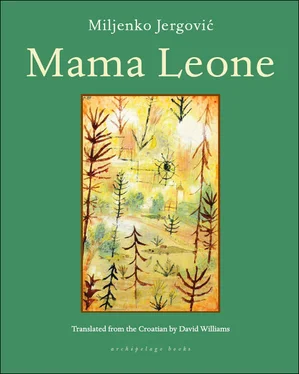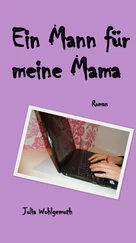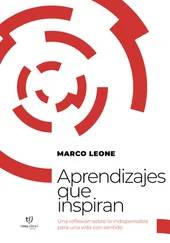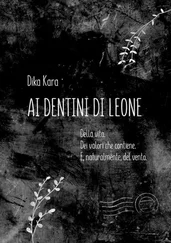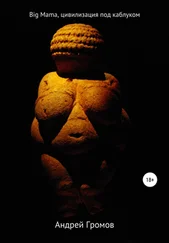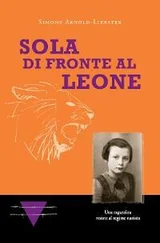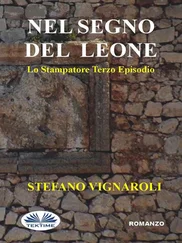Grandpa was waiting for us at the dining-room table. Old train timetables, beekeeping manuals, and a Hungarian dictionary lay strewn out before him, all to help pass the time quicker, so he wouldn’t think so much about us or fall to his fears for the mission on which his wife and daughter had set out. How was it? he took his glasses off the moment we came in. Let us catch our breath , said Mom. Now we’ll see how it was , said Grandma and reached for the plastic bag. Wait! Mom grabbed her hand. Fine, I’m waiting , said Grandma and put the bag down. Grandpa raised his eyebrows and went with the flow. This was unusual for him, but this was an unusual situation; everyone except me knew a life was splitting in two here, my mom’s life for sure, but maybe another life was involved too, my life, which, truth be told, had just begun, so hadn’t yet gotten that far.
Mom took the package out of the bag and unwrapped the paper. There, in the middle of our dining-room table, lay an enormous beef bone, picked perfectly clean. It was whiter than white, no traces of meat or blood, as if someone, the Almighty for example, had created it exactly that way and sent eternity out a message: “You shall be a bone and nothing else, you shall have no purpose nor meaning, you shall not procreate, nor shall you be either dead or alive.” Mom held her face in her hands so it wouldn’t shatter, and Grandma sat down. Grandpa said right then , and they all stared motionless at the bone.
Let me see, let me see , I ran around the table yelling. I couldn’t know something bad was happening because nothing had actually happened, nor did I sense their anger or sorrow because they weren’t angry or sad. Maybe they were white and cold, maybe they, at least now in retrospect, resembled that white bone on the fancy black veneer of the table. Useless and beautiful in equal measure, the bone was a final evil after which no good could ever come. For my mom the bone was the abyss at the end of the road; a sign she should turn around and start out on a new path, if there was indeed one she could ever envisage, sure from the very start that a bone for her son wouldn’t be waiting at its end.
Give it to me, give it to me , I howled, but they wouldn’t give me the bone. Grandpa picked it up, stood for a moment in front of the trash can — either the bone was too big, or he realized such things weren’t for the trash — then headed outside with it. I can imagine him walking through Metjaš with this ginormous beef bone, people scrambling out of his way, seeing in his eyes and from what was in his hand that he was mad. He carried it off somewhere, I’ll never know where, and returned half an hour later. I cried because they hadn’t given me the object of my affection.
The next day Dad asked Mom what his mother had given me because she hadn’t wanted to tell him, but Mom didn’t say anything. She didn’t know what to say. It wasn’t something you could put into words, and had left us more confused than all the dead pianos in the world.
I never went to that room again, nor did I ever see that other grandma of mine. I don’t even know how she died or where she’s buried, or whether Dad ever showed her my pictures again. If he did, she must have been a bit relieved. As I got older I looked less like him and she would have been able to believe God had quit testing her and answered all her prayers.
The violet fig for Nada Stilinović
When the frost bites hard and the teeth chatter and thick snows fall and no one can come to us and we can’t go to anyone, Grandma says this winter is nothing like the winter of 1943, the thought of which makes me freeze and my heart pound wild because I love the years before my time. That’s when miracles happened, and everything was huge and terrifying. It was a Friday in Zenica that winter when the Old Devil got dead drunk and headed for home. The snow was two meters high and blue in the moonlight, so he thought it was his bed or a duvet. God knows what goes through the head of an eighty-five-year-old who’s spent a minimum seventy-five of them dead drunk, maybe even eighty of them. But he saw that much snow and he just lay down and made himself comfortable, covering himself in it, and with his hands under his head started snoring away. Heaven knows how long he’d been lying there when the miners coming back from the second shift dug him out and got him to the hospital. Alive! Alive, I tell you, and he’d lain in the snow that winter of 1943, and that wasn’t like this winter, bit of frost, bit of snow, nothing much, but a real winter like you don’t get anymore, one I’ll never see in my lifetime again. They took the old coot to the hospital; luckily they didn’t take him home because the next day he got pneumonia, eighty-five years old and a temperature of 104 degrees, but you think that knocked the wind out of his sails? Fat chance! He shuffled to the window and tossed kids some money to get him medicinal alcohol from the drugstore, that hundred-proof stuff, but kids being kids they took the money and scampered. I think that killed the Old Devil and not the pneumonia. Only rakia could kill him, or truth be told, him not having it. He didn’t have the taste for anything else. He might’ve been a drinker, but the alcohol didn’t do him in, it got everyone around him: a first wife, then a second, both younger, then a daughter, another daughter, his sons scattering to the four winds. God knows who and what else that rakia killed, but it didn’t get him. He woke up drunk, went to bed drunk, forged the horseshoes in his workshop drunk, and drunk he laid waste to everything in his path and everything that let itself be laid to waste, all until that winter, the 1943 mother of all winters got him. Sometimes I think it got so cold just to knock the Old Devil off , said Grandma when the temperature fell, shaking with rage and anger, but not cold, because she wasn’t afraid of the cold. The Old Devil was the only person she hated in the entire world, and of all perversions, vices, and weapons, of all human depravities and evils, it was alcohol and alcoholism she had no truck with.
The Old Devil was my great-grandpa and his name was Josip, but Grandma never called him that, he was always the Old Devil, and no one, not even Grandpa whose father he was, ever got angry with her or corrected her or told her how swell it would be if she could call her deceased father-in-law by some other name, the one he was christened with for example, or the one by which everyone in Zenica knew him: Blacksmith Joža the Slovenian. At the mention of his father my grandpa would bow his head and bite his lip, just like his brothers, our uncles Karlo and Rudo, who never forgave him the rakia, nor themselves for having been children not able to save their older sisters from their deaths at my great-grandpa’s careless hand. Whenever the Old Devil came up, you saw the same disposition in Grandma, Grandpa, and Mom’s eyes, a familial mark of Cain, a color that differentiated the Rejcs from other people, a light-gray anti-rakia hue. It marked their lives in different ways, and boy did it mark my life with them. Grandpa would drink two short ones of rakia and even under threat of medieval torture you couldn’t make him have a third, dead sure that if he did he’d turn into the Old Devil. Mom would drink half a beer and already have the fear of God inside her that she was dead drunk and that the Old Devil was there smiling at her from just around the corner. Grandma didn’t drink at all. Not at New Year’s, not at birthdays, never! That was the Rejc family for you, and then I came along. Takes after his father’s side , said Mom. God, father, the kid doesn’t have any Rejc in him , said Grandpa. So it was no surprise I didn’t share the Rejc anti-rakia disposition, I wasn’t even scared of the Old Devil. Actually, I didn’t know anything about rakia, except that it stunk real bad and that the stink reminded me of the hospital, vaccinations, and having your tonsils out. But my great-grandpa, he loomed large all right.
Читать дальше
